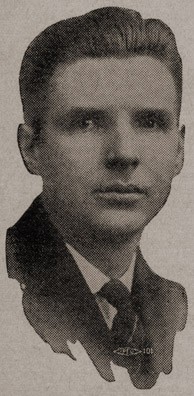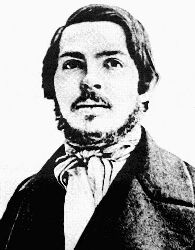En
Enderle, August (1887–1959) .
Mechanic, trade-unionist and SPD (Sozialistische Partei Deutschlands, Social-Democratic Party) member in 1905. Full-timer in 1910. Oppositionist during War, member of USPD in 1917, joined KPD(S) as individual. Organised Communist fraction in metal- workers’ union, delegate to Second RILU Congress. In Moscow during 1922–3, gave information to Trotsky about situation in Germany. Collaborated in KPD (Kommunistischen Partei Deutschlands/German Communist Party) trade-union commission, excluded as rightist in 1928, founded KPO with Brandler, joined SAP in 1932. In exile in Sweden in 1933, returned to Germany in 1945, joined SPD (Sozialistische Partei Deutschlands, Social-Democratic Party) and until his death worked in trade-union press.
Engdahl, John Louis (1884-1932)
 Engdahl is best remembered as one of the leading journalists of the Socialist Party of America, who joined the Communist movement in 1921 and continued to employ his talents in that organization as the first editor of The Daily Worker. He was also a leader of the International Red Aid (MOPR) organization based in Moscow.
Engdahl is best remembered as one of the leading journalists of the Socialist Party of America, who joined the Communist movement in 1921 and continued to employ his talents in that organization as the first editor of The Daily Worker. He was also a leader of the International Red Aid (MOPR) organization based in Moscow.
The son of Swedish Luthern immigrants, J. Louis Engdahl (who went by his middle name, “Louis”) was born in Minneapolis, Minnesota on November 11, 1884. Engdahl was intelligent and well educated, he graduated from the University of Minnesota in 1907, having paid his way through school by working as a telegraph operator and as City Editor of the Minneapolis Daily News. Engdahl was a member of the Socialist Party from 1908.[1] In 1909, he took a position as the Labor Editor of the Chicago Daily Socialist, assuming the mantle of Editor of that publicaton from 1910 until its termination in 1912.
Engdahl attended the Copenhagen Congress of the Socialist International in 1910 as a journalist on behalf of the Scandinavian Socialist Federation. He joined the Socialist Party of America in September of 1912. Despite his traveling to Europe for the Scandinavian Federation, it does not seem that Engdahl ever directly participated in language federation politics in any way.[2]
Louis Engdahl was a Socialist candidate for US Congress from Illinois in 1916; for the Chicago City Council in 1917; again for Congress in the Illinois 7th C.D. in 1918. He also was on the Organizing Committee of the Communist Propaganda League of Chicago from its origin in 1918 until its demise in 1919.
In 1914, Engdahl assumed the position of Editor of The American Socialist, the Chicago-based official organ of the SPA. He continued to edit this newspaper each week until it was suppressed by postal authorities in 1917. Thereafter, he moved to the successor weekly publication, The Eye Opener, which he continued to edit until 1919.
In February of 1918, Engdahl’s aggressive antimilitarism caused him to run afoul of the US Department of Justice, who targeted him as editor of the Socialist Party’s weekly newspaper under the Espionage Act for undermining the American military conscription program. Along with his party comrades Adolph Germer, Victor L. Berger, Bill Kruse, and Irwin St. John Tucker, Engdahl was indicted by a grand jury. The quintet was brought to trial before the harsh Judge Kenesaw Mountain Landis on December 6, 1918 (that is, after the war had ended), with the trial ending during the first week of January 1919. The jury found all five guilty as charged, and Judge Landis imposed a draconian sentence of 20 years in the Federal Penitentiary upon each. This sentence was later overturned on appeal for the reason of judicial bias.
Out pending appeal on $25,000 bond, Engdahl was a delegate from Illinois to the seminal 1919 Emergency National Convention of the Socialist Party, refusing to either support Adolph Germer, James Oneal, and the party regulars or to bolt the convention to join either of the fledgling Communist organizations – the Communist Labor Party or the Communist Party of America. Instead, Engdahl stayed inside the Socialist Party as a leader of the remaining Left Wing faction, which congealed as the Committee for the Third International in 1920. Engdahl served as Secretary of this faction until it departed the party in the aftermath of the 1921 Convention.
From 1920 until July of 1921, Engdahl served as editor of the Chicago Socialist, publication of Local Cook County of the SPA, until he was finally removed for political reasons. He was also the Secretary of Local Cook County SPA until his resignation on July 21, 1921.
After the disappointment of the 1921 Convention of the SPA, the Committee for the Third International left the party to mark the world with a short-lived existence as part of the Workers Council group – a small group of Communist adherents who sought to turn their backs on the sectarian infighting of the underground Communist parties. This pro-Comintern/anti-underground position proved to be timely, as in December 1921, at the Comintern’s request, a “Legal Political Party” called the Workers Party of America was established at a convention in New York. The Workers Council group was absorbed into the WPA at this time. He was elected to the 7 member “Administrative Council” of the WPA on Oct. 10, 1921. He stood as the WPA’s candidate for Congress in the New York 12th C.D. in 1922. In January 1923 he was elected by the 2nd Convention of the WPA to the party’s Central Executive Committee and sat on the inner circle of this group called the Executive Council.
Engdahl was employed as Managing Editor of the WPA’s organ, The Worker, from 1922. When that paper moved to daily status in January 1924, Engdahl wore the hat of Editor, although as an adherent of the minority Pepper-Ruthenberg-Lovestone faction, he was saddled with a co-editor from the majority Foster-Cannon-Lore faction in February. He continued as an Editor at The Daily Worker until 1928.
In February of 1925, Engdahl was a candidate of the Workers (Communist) Party for Chicago City Alderman.
From May 1927 through February 1928, Engdahl was a member of the Presidium of the Executive Committee of the Communist International, representing the Workers (Communist) Party of America.[3]
In July 1929, Engdahl was appointed by the CEC of the Communist Party as National Secretary of International Labor Defense (ILD), the party’s legal aid arm. He was named to the Polburo of the Communist Party in 1930 and was the party’s delegate to the Comintern in Moscow in that same year. He was also a member and later Chairman of the CPUSA’s Central Control Committee, as well as a member of the Presidium of International Red Aid (MOPR) – the international umbrella organization of the ILD.
In Moscow on MOPR business, Engdahl died of pneumonia on November 21, 1932, at the age of 48.
Despite the fairly vast number of words he wrote throughout his career as a journalist, Louis Engdahl did not write any books and only a handful of pamphlets, including Debs and O’Hare in Prison (1919); The Tenth Year (1927); Gastonia: A Class Case and a Class Verdict (1929) and Sedition! (1930). He was also the subject of two pamphlets published by the Communist Party in 1932 and 1935, respectively.
Engdahl’s papers are located at the University of Michigan.
Footnotes
1. G.M. Adibekov et al. (eds.), Politbiuro TsK RKP(b) – VKP(b) i Komintern: 1919-1943 Dokumenty. Moscow: ROSSPEN, 2004; pg. 905.
2. Henry Bengston, On the Left in America: Memoirs of the Scandinavian-American Labor Movement. [1955] Carbondale, IL: Southern Illinois University Press, 1999.
3. Adibekov et al. (eds.), Politbiuro TsK RKP(b) – VKP(b) i Komintern: 1919-1943 Dokumenty, pg. 905.
Engel, George (1836-1887)
One of the Haymarket martyrs. Engel was born in Bremen in Germany and came to America in 1873. He became radicalized after moving to Chicago, first joining the Socialist Labor Party and then the anarchist International Working People's Association (IWPA). Though known as very militant he was not at the Haymarket rally. Engel was one of the four executed in 1887.
Further Reading:
Engel's speech in court
Subject: May Day.
Engels, Frederick (1820-1895)
 Lifelong co-worker with Karl Marx; co-authored The Communist Manifesto among many others. Engels translated many of Marx's works into English. In his last years he was the outstanding figure of the young Second International.
Lifelong co-worker with Karl Marx; co-authored The Communist Manifesto among many others. Engels translated many of Marx's works into English. In his last years he was the outstanding figure of the young Second International.
See the Marx/Engels Biographical Archive for more detail.